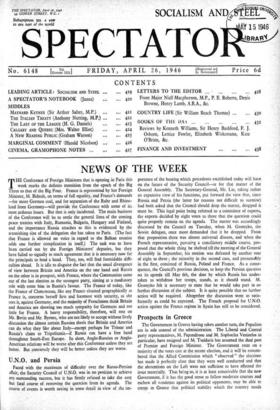NEWS OF THE WEEK
111 HE Conference of Foreign Ministers that is opening in Paris this week marks the definite transition from the epoch of the Big hree to that of the Big Four. France is represented by her Foreign Minister, M. Bidault, on terms of full equality, and France's demands —for more German coal, and for separation of the Ruhr and Rhine- land from Germany—will provide the Conference with some of its most arduous hours. But that is only incidental. The main business of the Conference will be to settle the general lines of the coming peace treaties with Italy, Rumania, Bulgaria, Hungary and Finland, and the importance Russia attaches to this is evidenced by the astonishing size of the delegation she has taken to Paris. (The fact that France is allowed no voice in regard to the Balkan treaties adds one further complication in itself.) The task was to have been carried out by the Foreign Ministers' deputies, but they have failed so signally to reach agreement that it is necessary now for the principals to lend a hand. They, too, will find formidable diffi- culties ahead. It is idle to disguise the fact that the usual divergence of view between Britain and America on the one hand and Russia on the other is in prospect, with France, where the Communists came out of the last election as the strongest party, aiming at a mediatory role with some bias in Russia's favour. The France of today, like the France of Clemenceau, like any France situated geographically as France is, concerns herself first and foremost with security, as she sees it, against Germany, and the majority of Frenchmen think Britain and America are showing too much sympathy for Germans and too little for France. A heavy responsibility, therefore, will rest on Mr. Bevin and Mr. Byrnes, who are not likely to accept without lively discussion the almost certain Russian thesis that Britain and America can do what they like about Italy—except perhaps for Trieste and Russia's claim to Tripolitania—if Russia can have a free hand throughout South-East Europe. In short, Anglo-Russian or Anglo- American relations will be worse after this Conference unless they are better. But conversely they will be better unless they are worse.


























